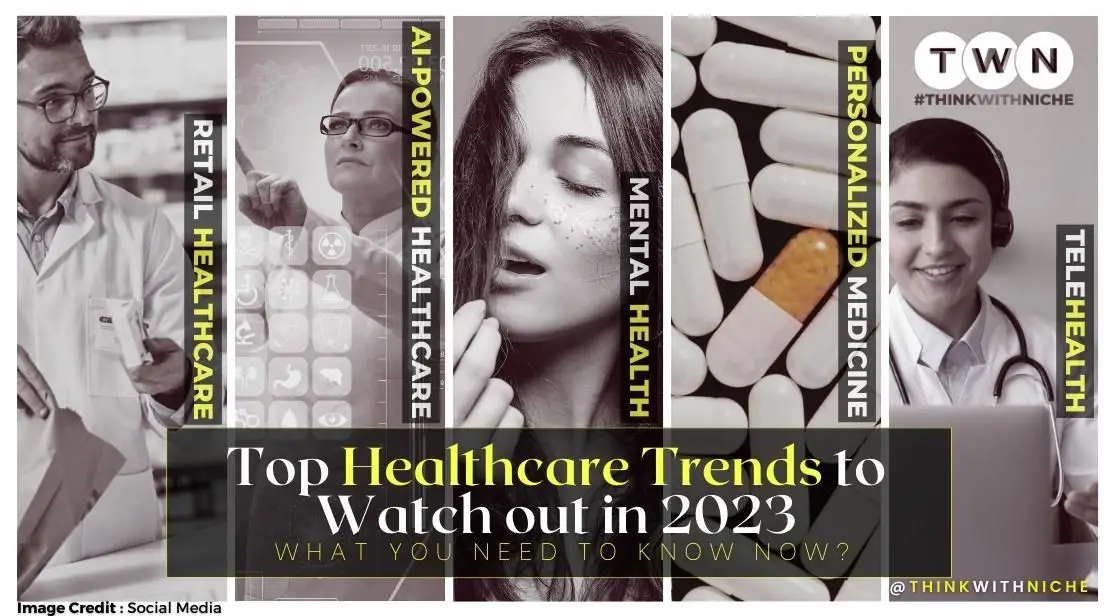Keeping up with the most recent trends might be difficult because the healthcare industry is always evolving. It’s critical to be updated and current on the top healthcare technology trends and digital innovations in 2023 and healthcare technology, from telemedicine to a greater emphasis on mental health. An exciting year with lots of developments and improvements in the healthcare sector is 2023. Here are the top 7 healthcare trends for 2023 that you should be aware of. These themes will influence the healthcare sector in the upcoming year, from the introduction of AI-powered new healthcare technology to the expanding need for tailored medication. We’ll talk about each trend’s advantages and disadvantages as well as how it will affect both patients and healthcare professionals. This post is a great resource for anybody interested in staying educated, whether they work in healthcare or not. Prepare to hear about the top 7 healthcare trends that will impact the industry in 2023.
Top 7 Healthcare Trends You Need to Know for 2023
1. Telehealth: A Growing Trend
There are several good reasons why telehealth is becoming more and more popular. Through the use of encrypted video conversations, this technology enables individuals to communicate with healthcare providers and receive help for their medical conditions whenever and wherever they need it. The elderly, those with impairments, and people who live in remote locations with limited access to healthcare can all benefit immensely from this. Telehealth may also be a fantastic option for healthcare practitioners who wish to communicate with their patients online given the rising number of people who now work remotely. As a result, they may offer medical services more affordably while simultaneously increasing patient access to treatment and promoting greater care coordination all around. Telehealth technology providers now delivering virtual care assistants with artificial intelligence, to interact with their patients digitally. These chatbots let you to a virtual conversation with a real doctor or nurse, ask questions, and receive advice all without having to speak to anybody directly. These developments in telehealth hold great potential for the sector and will undoubtedly lead to further growth in the coming years.
2. Mental Health: Increasing Focus and Awareness
The importance of mental health is growing, and both the media and healthcare professionals are paying greater attention to it. Regular exercise, a balanced diet, and strong social support are just a few methods to promote mental health status. And while these things are crucial regardless of your level of mental health, they might be especially beneficial for those who are dealing with diagnosed with mental health conditions. Every year, more people are given a diagnosis with mental illness, which increases the need for mental health services. Healthcare professionals are increasingly providing mental health treatments to fulfill this growing need. The mental health first aid concept, which emphasizes early diagnosis and intervention for mental health concerns, is also being adopted by many. This is a fantastic start in raising awareness about mental health issues and assisting people who require assistance in getting it. Telepsychiatry services have also become more popular, allowing you to communicate with a psychiatrist through a private video conversation. This eliminates the need for patients to travel to a clinic in order to attend therapy sessions. People with travel-impairing disabilities and those without convenient access to mental health services may find this to be very helpful.
3. AI-Powered Technology: Automating Healthcare
The healthcare sector is changing due to artificial intelligence, which is automating numerous patient care tasks. This pertains to both how healthcare professionals interact with patients and how they maintain patient data. There are several applications for technology that uses artificial intelligence, including reducing the growing expense of healthcare. By streamlining their processes, companies may cut expenses by using tools like data analytics, machine learning, and image recognition. By giving patients self-management tools, they may also assist healthcare practitioners in increasing productivity and patient access. For instance, AI-powered voice assistants are now able to assess your health information and offer individualized diet and exercise recommendations. Healthcare practitioners may interact with their patients more effectively by using AI-powered technologies. For instance, voice assistants powered by AI are currently being utilized to aid recommendations for improving your health. As a result, it is simpler for patients to follow their treatment regimens and maintain communication with their healthcare team. Additionally, AI-powered technology is being leveraged to give patients more individualized and interesting treatment. For instance, chatbots may be utilized to receive suggestions, counsel, and strategies for bettering your health. They may also be employed to offer psychological assistance, assisting those who are coping with mental health problems. All told, automation fueled by AI is transforming much of the healthcare sector, creating a more effective and individualized system.
4. Personalized Medicine: Tailoring Healthcare to Individuals
Individualized healthcare is now feasible thanks to the growth of customized medicine. DNA sequencing enables you to study your genetic composition and pinpoint your risk factors to improve your overall well-being. In order to assist you to understand your health risks and how you may enhance your general well-being, providers are now also employing artificial intelligence to examine your DNA. As more people self-identify as multi-ethnic, the importance of this individualized approach to healthcare is rising. As a result, there are more persons with mixed racial and ethnic backgrounds who may be at increased risk for some diseases due to one racial background but not for others. For instance, a person with mixed African-American and Asian ancestry may be more susceptible to heart disease but not diabetes. Regardless of your ethnicity, genetic sequencing enables you to determine your risk factors based on your DNA. In the upcoming years, it’s anticipated that this personalized approach to healthcare will develop, enabling people to obtain the treatment they require depending on their genetic composition.
Important Tags:
top 7 healthcare trends you need to know for 2023, healthcare technology trends and digital innovations in 2023, new healthcare technology







